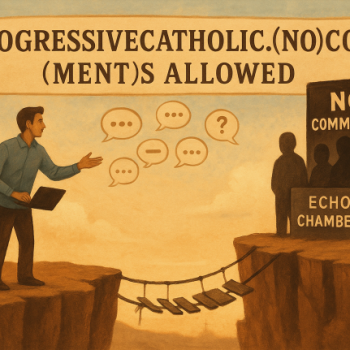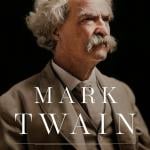GODSTUFF:
FAITH, DOUBT AND FAIRYGODMOTHERS
Cinderella: It’s just no use. I can’t believe. Not anymore. There’s nothing left to believe in.
Fairy Godmother: Nothing, my dear? Oh, now you really don’t mean that.
Cinderella: Oh, but I do . . .
Fairy Godmother: Nonsense, child. If you’d lost all your faith, I couldn’t be here. And here I am.
• • • •
What do you do when you’re not sure?
Playwright John Patrick Shanley begins his play “Doubt” with a priest asking that very question. And he ends his magnificent parable with the words, “I have doubts — I have such doubts,” spoken by a nun.
As I walked out of Chicago’s LaSalle Bank Theatre after seeing a production of “Doubt” earlier this week, the playwright’s opening question bobbed to the surface of my busy consciousness while the best friend and I tried to decide which way to turn — literally.
Like most audience members, I dare say, I left the theater with more questions than answers, and not just about whether the fictitious Father Flynn indeed had molested his young student, Donald Muller, as the irascible Sister Aloysius believed.
What do you do when nothing seems certain, when you feel lost, when you have doubts? Do you lose faith, cash it in, walk away? Or do you live with uncertainty, fight it out, follow your gut and try to make the best decision you can?
“Doubt” calls into question what truth is, and what role faith might play in telling fact from fiction, and, more important, fact from truth.
It’s a magnificent, difficult, unforgettable drama.
So as we alighted the theater, the best friend and I were looking for somewhere to discuss the play over a glass of wine, or two. We were tarrying on the sidewalk trying to decide whether to walk east or west on Monroe when I heard a familiar voice call my name.
“Hey, Caaaathleeeeen!” the flat, decidedly South-Side, slightly smoky voice shouted over the post-theater scrum.
When the crowd parted, I saw her standing on the curb between two parked cars, grinning as she tossed a Marlboro Light into the gutter.
My Fairy Godmother.
Well, in truth, one of my Fairy Godmothers. I have a whole team of them — four or five back in Connecticut and a gang of 10 here in Chicago. They adopted me years ago and have a habit of turning up unexpectedly at times like these, as if out of thin air.
To my delight, the impish chief Chicago Fairy Godmother was not alone. She had three of her posse with her. Half of the godmothering team was magically assembled on the sidewalk before my blinking eyes.
They, too, had just seen “Doubt.” There was a lot to talk about, in addition to the provocative fodder provided by Shanley, as it had been months since I’d seen any of them. So when one pointed her wand at a storefront that said “Wine Bar,” I dutifully followed their trail of fairy dust across the street.
These women, the Fairy Godmothers, are quite a group. They’re all a decade or two older than me, most of them are South Side Irish, a few of them are still mass-going Catholics, at least one of them is a Buddhist, about half of them are cancer survivors, most are mothers, and all are unapologetically free spirits.
A cross between the cast of “Hair” and a White House cabinet, they are ribald and wacky, wise and caring, smart and sensitive, fierce and loyal, courageous and faithful. They listen, advise, feed me — and kick my butt as needed.
The Fairy Godmothers are full of faith, in spite of what Shanley in the introduction to “Doubt: A parable” calls “the bitter necessities of an interesting life.” Miscarriages, divorces, death, illness, addiction, depression, violence, bigotry, poverty, wealth, love, loss and doubt.
A while back, I had the chance to talk to Shanley about doubt and faith. He said something that perfectly describes these remarkable women/fairies, and what they offer most powerfully and simply with their presence in my life.
“The soul is in a person and things come to the soul from the outside,” Shanley said. “Courage comes from the outside. You have a certain amount and you use it up and you are weak and trembling and afraid and you have to ask for more. And then it comes, and you have more and you can do more gutsy things.”
Gutsy. That’s the Fairy Godmothers and that’s what they’re trying to cultivate in me, I believe. It’s a spiritual quality, really, the trait that fuels great leaps of faith.
Sister Aloysius is gutsy. She’s also cold, judgmental and difficult. Those are her flaws. Gutsy is her saving grace and, perhaps, that of her young charges.
In “Doubt,” Sister Aloysius storms ahead with a campaign to get rid of Father Flynn, a parish priest and basketball coach whom she suspects is molesting one of her students. Actually, she doesn’t suspect. She knows. Not that she has any evidence. She just . . . knows.
The question of whether Sister Aloysius is right about Father Flynn remains.
“Doubt” is untidy, much like real life.
Maybe that’s why the Fairy Godmothers and I liked the play as much as we did. Because, as the great theologian Paul Tillich once said, “Doubt is not the opposite of faith; it is one element of faith.”
© Copyright 2007 Sun-Times News Group















